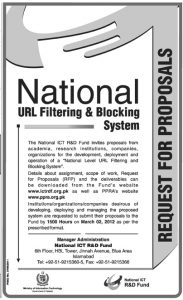Block, ban, censor. These seem to be the only options ever considered by the Pakistan government when it comes to the Internet.
Ever since the 2010 ban on Facebook was imposed and subsequently lifted, there were whispers about the government investing in filtration software. In 2010, a blanket ban was the only option since blocking URLs was too time consuming a task for the government to perform; neither was it the most feasible option in terms of resources and manpower required.
Below is an except from Newsline’s June 2010 cover story, discussing the Facebook ban and the content filtration:
“In a report submitted to the court, the PTA said this: “The complete stoppage which required blocking of 80,000+ users pages per each group over the Facebook website … was more than impossible to attain while considering the available time and the tendency of the available content to shock and outrage the feelings of Muslims inside Pakistan. Keeping in view the situation, it was decided that a complete ban on Facebook website … would be imposed in order to avoid further visibility of such hateful content inside Pakistan.
The same argument was stated in defence of the blockade on YouTube [in 2006].
So to avoid public outrage, blanket bans are the only option at the moment. This is why the government is seriously looking into filtration software to screen Internet content on a regular basis. Obviously, there are many drawbacks to this. And end users are mainly affected in the process.
Over the last week when content was being filtered, Internet speed was considerably reduced. Quoting statistics, Jehan Ara, the president of P@SHA says, “When Internet monitoring and surveillance takes place and when content filtering is being done, service can depreciate anywhere from between 10-75% – and usually at least 35%.” If this slowdown to productivity continues, the financial losses will be devastating for Pakistan and the IT industry. Many citizens are employed in micro and macro level online businesses and have already been directly affected.
“As far as the IT industry is concerned,” says Jehan Ara, “trust deficit and unreliability is something that clients will never stand for. If they do not know when we can have access denied to various portions of the Internet, why would they have faith in our ability to deliver and meet deadlines? The IT and IT-Enabled Services industry is young and has been growing at a good rate, but it is fragile and actions such as this can bring it tumbling down faster than anything else. A strong IT infrastructure and continued and fast access is what we need without the sudden and unexpected brakes.”
In February 2012, the Pakistan The National ICT R&D Fund, which falls under the Ministry of Information Technology (MoIT), advertised seeking proposals from companies for a ‘national level URL filtering and blocking system’ (see detailed proposal here) setting the final submission date of proposals for March 2, 2012.
Why the Fund was established and what its vision and objectives are, are as follows:
The government of Pakistan has mandated that a certain percentage of gross revenue generated by all telecom service providers be allocated to development and research of information and communication technologies with the vision to transform Pakistan’s economy into a knowledge based economy by promoting efficient, sustainable and effective ICT initiatives through synergic development of industrial and academic resources. To achieve this vision National ICT R&D Fund has been created. This vision will be realized by pursuing the following goals:
• Cultivate industry-academia partnership by funding concrete development and research initiatives.
• Enhance the national ICT related human resource development capacity manifolds by facilitating industrial demand focused human resource capacity building and R&D capabilities in the country and promoting ICT related educational programs and activities.
• Make Pakistan an attractive destination for service oriented and research and development related outsourced jobs.
• Use ICT as a tool for wealth creation and upward mobility for economically challenged groups of citizens.
• Spread the ICT activities on a true national level.
With these clearly stipulated goals, one wonders where a national firewall fits in. How does it aid in transforming “Pakistan’s economy into a knowledge based economy.” How does it promote ICT as a “tool for wealth creation and upward mobility?” How does a filtration system “cultivate industry-academia partnership by funding” or “promote ICT related education programme and activities?” And, above all, how does it possibly enable Pakistan to become an “attractive destination for service-oriented outsourced jobs.” In fact, does it not, on the contrary, hinder the realization of the above-mentioned goals?
According to an article in The Gulf Times, $10bn is required for the development of a national firewall at the scale Pakistan is seeking. That is a lot of money. Where is this money coming from and is it the Fund’s mandate to pour so much money into a project of this nature? Couldn’t it be put to better use, towards projects that actually improve infrastructure and boost growth?




Technical discussion on this issue are happening here: http://bit.ly/yyPVrH